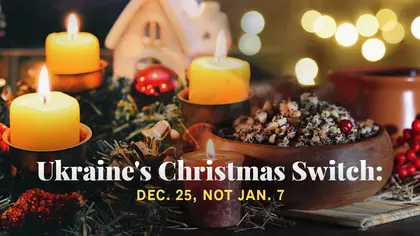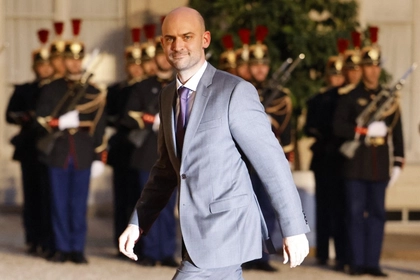This year, many Ukrainians are celebrating Christmas for the first time on Dec. 25.
Most are Orthodox Christians and, unlike previous years, will be using a new calendar for Christmas instead of the one historically shared with Russia, which celebrates Christmas on Jan. 7.
JOIN US ON TELEGRAM
Follow our coverage of the war on the @Kyivpost_official.
Why has Ukraine changed when it celebrates Christmas?
The idea of celebrating Christmas on Dec. 25, a common practice in the Western world, had previously been discussed in Ukraine before the Russian invasion. Historically, most Christian parishioners in Ukraine have observed Christmas on Jan. 7, following the old Julian calendar.
Since the Orthodox Church of Ukraine (OCU) gained canonical status in early 2019 from Constantinople, there has been an ongoing debate, led by Metropolitan Epiphanius, on whether Ukraine should shift its Christmas celebration to Dec. 25, to be in line with the Greek Orthodox Chruch, as opposed to the Russia Orthodox Church, which still has influence in Ukraine.
Around a year before the invasion, in December 2020, Epiphanius suggested that a decision could only be made when "the church matures [and] the believing people are ready for it."
The Russian invasion has sped up those changes, as Russian propaganda had long used narratives associated with "Orthodox values" to foster a sense of unity among "Slavic nations."
In December 2022, the leaders of the Ukrainian Greek Catholic Church (UGCC) and the OCU initiated joint efforts to transition to the Revised Julian calendar (which celebrates fixed holidays, such as Christmas, according to the Gregorian calendar, and moveable feasts, such as Easter, according to the Julian calendar) used by many other Orthodox Churches in the world.
![[VIDEOS] North Korean Troops in Russia Confirmed](https://static.kyivpost.com/storage/2024/10/19/a6f6a4c5d74d066019e5812a20c6514f.png?w=420&q=75&f=webp)
[VIDEOS] North Korean Troops in Russia Confirmed
Their work led to the adoption of the Revised Julian calendar on Sept. 1, 2023.
Christmas celebrations: East vs. West
The way Christmas is celebrated can depend on whether someone is part of the Western or Eastern Christian tradition.
Orthodox and Greek Catholics celebrate Christ's birth as a significant religious event, though second to Easter in importance.
A Nativity fast, observed for 40 days prior to Christmas, involves spiritual cleansing and repentance. Many Orthodox Christians abstain from eating meat during the Christmas fast.
On Christmas Eve, known as Holy Evening, families prepare 12 Lenten dishes, such as uzvar, pampushki, borscht with dumplings, and kutya, in honor of the 12 apostles.
Dinner begins only after the first star rises, marked by the lighting of a Christmas candle, a prayer, and a food blessing.
Christmas involves worship, visits to relatives, caroling, and nativity scenes depicting Christ's birth.
In the Western Christian tradition, Christmas is the primary religious holiday, and has become a family celebration. It is also a time associated with presents under the Christmas tree, delivered by Santa Claus on the night of Dec. 24 – not to mention the attendant consumerist bonanza.
Advent, a month-long period before Christmas, involves spiritual and family-focused activities.
On Dec. 25, Turkey or duck is a common main dish in many countries like the US, UK, Germany, France, and others.
Gift-giving, carol singing and nativity plays are prevalent customs among Western Christians. In the UK particularly, Christmas is the season of pantomimes, with family-oriented musical comedy stage plays taking up much of the theater space.
You can also highlight the text and press Ctrl + Enter






